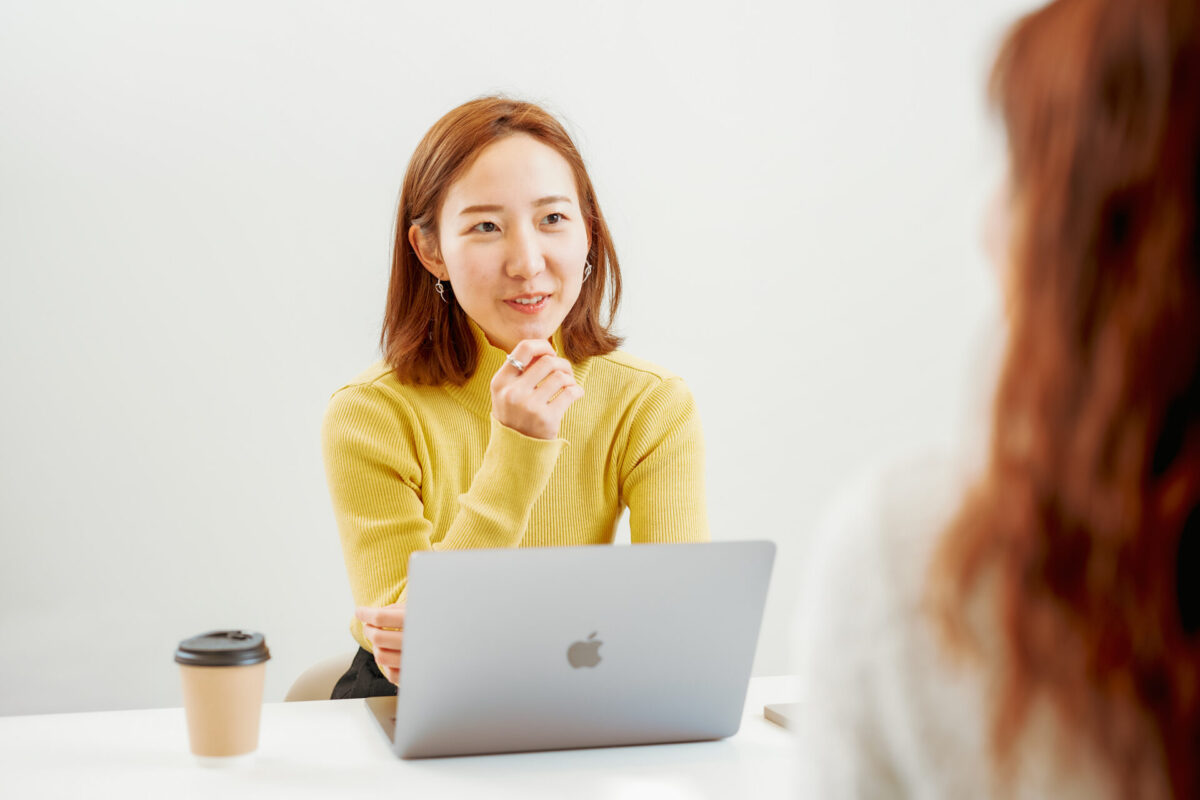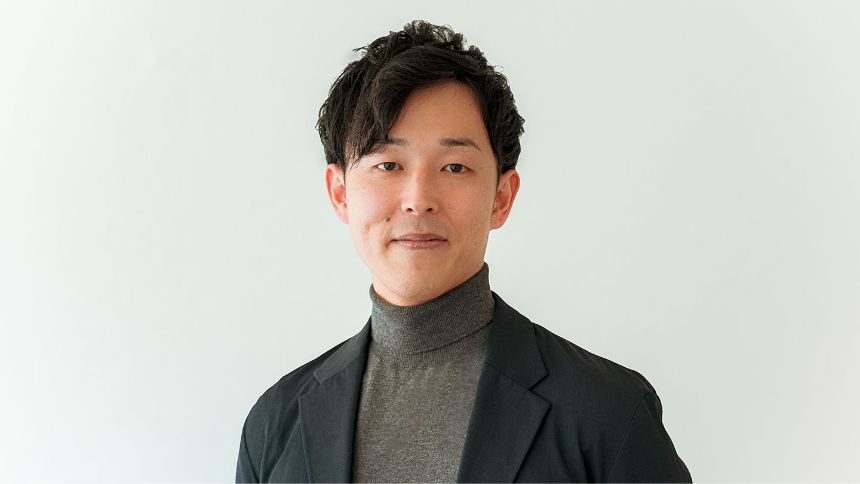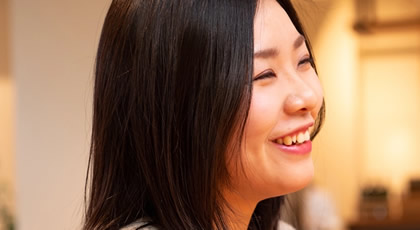
Righting Wrongs with Reason and Passion
After graduating from Doshisha University's Faculty of Global Communications in 2017, Mao Fujihara joined Procter & Gamble (P&G), and in just three years became the youngest member to be selected for the highly competitive Sales Planning Division. Mao was responsible for branding within the Sales team and continued to develop her skills at an astounding pace. In January 2022, resonating with the content and vision of TYPICA, she began working as Community Manager for Japan - and is also the Project Manager for TYPICA GUIDE and TYPICA Annual Meeting. A rising star at P&G, her sudden career shift came as a surprise to her colleagues. We spoke to Mao to find out what was behind her motivation to join TYPICA.

Being true to yourself
“Coffee producers in Africa and Central America are pressured by global conglomerates to sell their produce at an unfairly low price. But not us. Our fairtrade policy ensures that producers get a fair price for their produce, and helps us develop a sustainable relationship with the producers.”
January 2015. Mao was taking part in a training session for her part-time job at Starbucks when she first learned about the harsh reality of the coffee industry. From that moment, Mao no longer saw the coffee producers as strangers living in a far-off country, but people with livelihoods.
Mao was frustrated at the unfairness of it all, but what could she do as a university student? She had neither the skill nor the experience to solve a problem so complex. In her third year at university, she took part in a volunteer program in Cambodia. The program brought together students from all over the globe and they discussed ways to find a sustainable solution to the problems the people around them faced. However, while the discussions had value, nothing was put into action.
Mao decided that if she wanted to make real change, she needed first to hone her business skills, and a manufacturing company would be the best place to give her an understanding of the whole picture, from production to distribution to sales. Mao chose P&G because she knew that to achieve her goal, she would need to learn from the best, in a competitive and challenging environment.
“With P&G, everyone is treated as a fresher, even if you’ve moved from a different department or come in mid-career. The company takes an action planning approach which means that recruits fresh from uni are given full-on responsibility after only a month of training. And unlike other companies where people tend to become more laid back after a while in the job, at P&G people are still pushing and challenging themselves twenty or thirty years in. There’s also a tolerance for failure which means people are more willing to take risks. So I knew it would be the best place to hone my skills.”
Mao knew that this was not going to be a long-term commitment, but she did not set a limit on how long she would stay, and she was not prepared to stand idly by on the sidelines waiting for things to develop. Mao was driven by the desire to learn as much as she could as quickly as possible, and after two years in sales she became the youngest person to join the company’s highly-competitive main Sales Planning Division – an elite team which brought together the best talent in sales. Mao quickly made a name for herself within the company.
“I think what helped me most is always speaking my mind and being clear about my vision. I‘m good at communicating my ideas and I’ve never been shy about questioning the opinions of people who are senior to me. I’m also impatient by nature so I’m the first to notice when things are coming to a standstill – and the last to let it go!”

As a member of the Sales Planning Division, Mao was responsible for branding, creating sales stories, strategies, and more, and communicating these to the 300 or so sales reps in the department. She had to think about how much to budget for marketing? What return can we expect on sales? What sales method will be the most effective? Knowing that each sales rep would be implementing her strategies was a huge responsibility.
Only a few years out of university, she lacked the experience of other members and there were times when people criticized her views as being too short sighted, and ignored her ideas. Mao was in charge of sales in Japan, the biggest market in Asia. She had to constantly check in with each department in the company and every day had a mountain of tasks to get through. Overworked and over capacity, the pressure was overwhelming and there were times when she experienced periods of depression.
Even her boss urged her to take a break. But Mao refused. She was determined to finish what she’d started.
“I was too proud to give up before I’d finished what I wanted to do. And I knew that if I took a break, it would just put pressure on someone else, and I couldn’t do that.”
Two years on in the Sales Planning Division, Mao felt that she’d achieved what she wanted here and began to think about her next step.
“I wanted to do a job that had a direct impact on someone’s life, and I couldn’t do that working for a manufacturing company who sells goods to consumers via a store. I loved the company, but I could tell my love for the job was waning.”
It was around this time when Mao met TYPICA’s founder, Masashi Goto. She was still thinking about what to do next, and hadn’t made a decision about her present job. But after talking with Masashi, and hearing about the content and vision of TYPICA, she was reminded of the indignation she’d felt back in university, and she knew this was the job for her.
Less than a month after meeting Masashi, Mao handed in her notice and left P&G in December 2021, four years after joining the company. In Japan, a career with a brand as renowned as P&G is a gold star on your resume, and with Mao as a favorite for a future manager, her former colleagues saw this shift as throwing away a huge opportunity. But Mao doesn’t see it that way.
“I’ve always been true to myself so it was an easy decision for me to make. I knew being at TYPICA would make the best use of my time and energy.

A year to remember
Mao’s ability to grow and evolve at lightning speed comes from her experience in high school.
Mao’s father is a doctor, her mother a stay-at-home mom, and her older brother and sister are studying at a top-level university and medical school. Mao on the other hand never took her studies seriously and spent her early high school years in the bottom grade tiers.
Even when she was predicted a 35 for her university entrance exam – far lower than the 50 required to get into a mid-level university – she focused on her band rather than hit the books, adding to her parent’s concern. The change finally came in the second term of her second year of high school. Her mother, overcome with worry about her future, asked, “How will you make a life for yourself on these grades?”, and broke down in tears. It was a wakeup call. She’d had no idea how much pain she was causing her mother.
The final catalyst came from a teacher at cram school. Mao made a mistake on an elementary school level question in an English test. Her error was shared with the class, everyone laughed at her and she was made to look a fool.
These two incidents combined together to ignite a fire in her that could not easily be extinguished. From then, Mao was a completely different person. With her goals set on the Faculty of Global Communications at Doshisha University, one of the toughest private universities to get into in the Kansai region, every minute of her day was spent making up for lost time.
She carried a text book to dinner, to the bathroom, to everywhere she went, cramming her head with as much knowledge as she possibly could. She would spend all day at the cram school, sometimes studying for more than 12 hours a day. Her hard work paid off and she was able to raise her predicted grade to the required 60. And when she took the exam, she got the grade needed to get into her first choice university.
“I wanted to prove to the teachers at the cram school that they were wrong about me. Of course I felt bad about upsetting my mom, and there was that part of me who wanted to show the teachers what I was made of. But the biggest motivator was seeing how my hard work paid off. I could see myself getting better the more I put into it and that was what kept me going. That year taught me that if I give it my all, there’s nothing I can’t accomplish.
It was such an intense experience that even now, I feel like there’s nothing I can’t do if I really set my mind to it. Of course, it hasn’t all been easy. There were times at P&G where I thought I’d never make it, where I felt like I was failing and I wanted to give up. But that last year in high school gave me confidence, a complete trust in my own abilities, and that’s what keeps me going.”

Cool reasoning and fierce passion
After running full pelt for a year, Mao was not ready to slow her pace down. Pushing herself to grow and develop is how she was able to achieve so much in so little time at P&G. Her friends and family say she’s like a steam engine, and Mao has to agree.
“When I get to where I’m headed and achieve what I want, I still don’t feel like I’m done or that I want to take a rest. I’m always ready to head full throttle to the next destination. After talking to Masashi, I knew I’d be able to give 100% to TYPICA, and that’s what made me decide to join. I think that if I didn’t have a clear goal to charge to, I’d probably end up losing my direction, and my passion for life.”
Mao might be going at full speed, but she never heads out without a plan. She always thinks seriously and strategically about her direction and purpose before she starts anything.
“I chose to enter P&G over volunteering or joining an NPO because I wanted to develop my skills in a dynamic and competitive environment, and I knew P&G would be a good fit for me.
My experience in Cambodia at uni showed me that volunteering was not a sustainable way to support the country. There were companies who would donate computers to the region, but giving people things is not the same as helping them to make things. Giving just teaches people what they don’t have. It doesn’t help them to change their situation.
When I saw the smiling faces of the kids living on the trash heaps, I knew that they weren’t aware of lacking anything. Giving them something they didn’t even know they wanted doesn’t feel like a solution at all.
But when it comes to coffee producers, their hardship comes from unfair practices in the industry and not being rewarded for their hard work. And this is something I can help with, something I can try and change.”

Giving support where its needed most
As a community manager, Mao is responsible for finding new roasters in Western Japan who can partner with TYPICA, and sales to increase green bean distribution. The latter means there’s a lot of traveling to build relationships with the roasters.
“Sales shouldn’t be a one way street. I want to meet the roasters and learn who they are and what they want. It’s important to me that I meet the roasters in person because there are things that you only notice when you physically meet someone. I try to pick up on as much as I can to find out what each roaster needs. If I can give them what they want, then it’ll lead to a result for me too.”
Mao has always been a people person. And this job is the perfect way to make use of her outgoing personality.
“I’m not shy or afraid of putting myself out there. I make friends with everyone I meet, even if we only talk for a little while. At my last job, I was on friendly terms with clients who other colleagues were terrified of. When I meet someone, I want to know as much about them as I can – the good and the bad. So even if they get annoyed at me, I don’t hold it against them, instead I try to think about their reasons. I never hold a grudge.
No matter how small or insignificant our interactions, I want to bring happiness to other people’s lives. I’m the type of person who can’t ignore someone when they’re in distress. I can’t let an injustice pass; I have to stand up for what’s right. It’s often hard to tell when people are struggling, but if I can help someone to lighten their load even just a little, I want to do all I can to help.
I love to help people, and it’s what gives my life meaning. So the pandemic was hard for me. Isolation was not good for my mental health.”
For Mao, who realized back in university that the world needs a more sustainable solution, meeting a company like TYPICA who is trying to bring about real change almost feels like destiny.
“I’m excited about meeting producers, learning more about their situation and listening to their stories. There’s so much that’s going to keep me busy, it’s great. I joined TYPICA because I want to improve the lives of coffee producers, but even if I achieved that, I’m not sure I’d stop there. There’s a lot that needs to change in this industry.
If I were to leave TYPICA, it would only be because the world had changed to one where the producers were financially independent and we were no longer required. And if that happens, I’ll find another wrong to set right and start pouring all my energy into fixing that.”
Text: Tatsuya Nakamichi
Photo: Kenichi Aikawa























